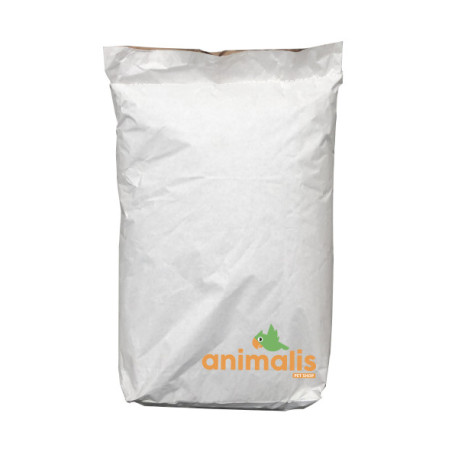- New






Reference: CHIA-18
Chia is a sage. It is an annual plant that can reach up to 1 meter in height, with the scientific name Salvia hispanica.
The composition of chia seeds closely resembles that of other mucilaginous seeds like flaxseeds and psyllium. Unlike flaxseeds, chia does not have anti-nutritional factors, which limit the use of flaxseeds without prior heat treatment. Anti-nutritional factors are cyanogenic glucosides or linatins, inhibitors of vitamin B6 that prevent its action. Moreover, chia has a much more pleasant taste than flaxseeds, and birds consume it more readily.
Chia is a sage. It is an annual plant that can reach 1 meter in height, and its scientific name is Salvia hispanica.
The composition of chia seeds closely resembles that of other mucilaginous seeds like flaxseeds and psyllium. Unlike flaxseed, however, chia does not have anti-nutritional factors, which limit the use of flaxseeds without prior heat treatment. The anti-nutritional factors are cyanogenic glucosides or linatines, inhibitors of vitamin B6 that prevent its action. Additionally, chia has a much more pleasant taste than flaxseed, and birds are more willing to consume it.
Chia sage seeds are rich in flavonols (myricetin, quercetin, kaempferol), flavonol glycosides, chlorogenic acids, and caffeic acid.
They are rich in proteins and fibers. With a varying rate ranging from 16 to 23% protein, they are higher than wheat (14.7%) and corn (14%). They are also very rich in lipids containing a high proportion of omega-3 acid (alpha-linolenic acid represents 68% of the lipids, or 21% of the total) and a favorable omega-3 to omega-6 ratio around 3-4.
Strengths: Chia seeds provide a good source of calcium and phosphorus and a very good source of dietary fiber and manganese.
Chia has good antioxidant activity provided by its polyphenols (chlorogenic, caffeic acids, and flavonols).
Thanks to its small black or pretty electric blue seeds, the poppy is recognizable among thousands. A cousin of the poppy, the poppy is known for its content of good fats and micronutrients essential for the proper functioning of the body.
Hemp seeds are very nutritious and contain more essential fatty acids (EFAs) than any other source and rank second, after soybeans, for their richness in highly digestible proteins of high biological value. They are particularly recommended during reproduction periods to stimulate the reproductive instinct of birds.
The peeled oats from Versele-Laga are a high-quality food primarily intended for birds. Offered in a 25 kg bag, these peeled oats are ideal for bird enthusiasts wishing to provide a nutritious and natural diet to their birds.
Peeled oats are rich in essential nutrients for birds.
Canary seed is a grass, an annual plant that can reach up to 1m in height, with seeds found in the inflorescences. These seeds make up a significant portion of most bird seed mixes.
• Excellent for canaries, European and exotic birds, budgerigars, and large parakeets.
• EXTRA canary seeds have undergone additional cleaning and are of exceptional quality. Unique on the market!
Pine seeds are a good source of Phosphorus, Magnesium, Zinc, Manganese, Copper, Iron, Vitamin E, K, B1, B2, B3, B9.
Paddy Rice 20kg - Versele-Laga
Paddy rice seed or raw rice that is very suitable for exotic birds with strong beaks such as padda and birds of Asian origin. This seed is also appreciated by parakeets, parrots and exotic doves.
Radish seeds have antioxidant, detoxifying, draining, and decongestant properties.
Chenopodium quinoa is an annual plant, one to two meters tall or more. The central stem is cylindrical at the collar and becomes more angular higher. It can be unique or have many ramifications, with a diameter ranging from one to eight centimeters and a height of 0.5 to 3 m, depending on the varieties and growing conditions such as seeding density or fertilization9. Its color is also very variable: uniformly green, green with purple or red streaks, or uniformly red.
Clover stimulates the immune system and slows down cellular ageing through its excellent antioxidant properties. Rich in vitamins B, C, E and provitamin A.
Sunflower seed contains almost 40% fat, but also proteins, carbohydrates, vitamins B and E. We quantify on a sunflower seed nearly 600 Kcalories per 100 g.
It satisfies throughout the year, the needs of a wide variety of birds, including the smallest of them.
Sunflower seeds are a real treat for our birds who love them!
Flaxseed is rich in omega 3, which is essential for the cardiovascular system.
Clover stimulates the immune system and slows down cellular ageing through its excellent antioxidant properties. Rich in vitamins B, C, E and provitamin A.
Aleppo pine seeds (medium) for parakeets, parrots, crossbills... is a natural seed of the pine cone, a delight for your birds, this seed also has therapeutic properties, it can be added to the seed mix or in a separate feeder.
The canary seed is a grass, an annual plant up to 1m tall, the seeds being found in the inflorescences. These seeds represent a significant fraction of the majority of bird mixtures.
• Excellent for canaries, European and exotic birds, wavy parakeets and large parakeets.
• EXTRA canary seed has undergone extra cleaning and is of exceptional quality. Unique on the market!
Spinach seeds contain vitamins A, B1, B2, B3, B7, B9 and C, mineral salts and trace elements. Regular consumption helps to strengthen the feathers.

Chia is a sage. It is an annual plant that can reach up to 1 meter in height, with the scientific name Salvia hispanica.
The composition of chia seeds closely resembles that of other mucilaginous seeds like flaxseeds and psyllium. Unlike flaxseeds, chia does not have anti-nutritional factors, which limit the use of flaxseeds without prior heat treatment. Anti-nutritional factors are cyanogenic glucosides or linatins, inhibitors of vitamin B6 that prevent its action. Moreover, chia has a much more pleasant taste than flaxseeds, and birds consume it more readily.
